Garage Find: 1958 Austin-Healey 100-6
Humans tend to fall in love without looking beyond the surface of that which they desire. While for normal people, falling in love usually ends happily. For car people that love blindness can lead to catastrophe. Take for example this 1958 Austin-Healey 100-6 for sale on eBay in Weston, Massachusetts. On the surface, Big Healeys are some of the most gorgeous cars ever designed and built. When you look beyond that beautiful body’s graceful lines trouble can lurk just below the surface in the form of rust. With a $15,000 Buy It Now price and an opening bid of $6,000 is this a diamond in the rough or a certain case of heartbreak once the love is all gone?
The Austin-Healey 100-6 was sort of the middle child in the series of cars commonly referred to as “Big Healeys.” Austin-Healey started with the basic body shell you see here with the Austin-Healey 100. This first version was perhaps the most elemental and beautiful of the series. Powered by a large displacement inline-four with a huge for the time 2,660 CCs of displacement, these cars were often equipped with overdrive units. More of a grand touring car than a traditional sports car, these Big Healeys managed to become quite capable race cars. They were replaced by the 100-6. This model boasted a slightly longer wheelbase and a smooth inline six-cylinder engine under the hood. Produced from 1956 through 1959, that version was replaced by a more refined and luxurious model called the 3000.
Big Healeys sold well in the United States. Bigger than the usual British sportscars that America was used to and capable of being comfortable at speed due to their overdrive transmissions and larger-than-average displacement engines, Americans developed quite a fondness for them. The beautiful design helped as well. Some of the later cars were even available with small seats behind the driver and passenger seats in case you wanted to bring your kids or dissuade anyone from carpooling to work with you. These were charitably called “occasional seats.”
Governmental regulations in the United States, internal politics in whatever they called BMC at that moment, and diminishing demand spelled the end for Big Healeys in the showrooms. However, the cars have developed quite a following after production stopped. Prices for these vehicles have always been at the top of the British sportscar world. Demand has outstripped supply in the past to the point that the design was copied by one of those replica car companies you saw in the back of Car and Driver magazine in the eighties. Aftermarket parts are available, and the mechanicals are straightforward. If there ever was a perfect British car to restore and enjoy, a Big Healey would be it. Just pick your version and motor away.
As you can see, it is easy to fall in love with one of these amazing convertibles. The problem is that turning a blind eye to problems can be disastrous. Rust is far and away the biggest concern. British cars of the era are prone to rust if not properly cared for. As with any convertible, the time when they passed into being just another old car was the most dangerous. When holes developed in the top, an open car more closely resembles a bathtub. Moisture soaks into the insulation and carpets and can remain for weeks at a time. That moisture will soon find its way out through the floorboards if not properly addressed. Never mind the moisture that routinely leaked past the weatherstripping and into the cockpit when these cars were being driven in the rain.
The Healey you see here looks more than restorable on the outside. However, a look inside the cockpit and under the car reveals problems that may be too excessive for an amateur restorer. The damaged areas seen in the picture must be ruthlessly cut out and replaced. Before that surgery, the car would need to be trussed up to make sure everything was squared up when welded back together. Mistakes can result in anything from a door not shutting properly to an outright dangerous handling vehicle. Anything is repairable if you throw enough money at it. However, rust this extensive is a big warning sign.
Under the hood is a free-turning example of the later 117-horsepower inline six that made the car drive so smoothly. The seller tells us that one of the cylinders is low on compression. The cause of this irregularity is not known. The good news is that the British Motor Industry Heritage Trust has certified the car as a matching numbers car. This will enhance the value of the car once it is restored as long as that work is properly done.
The seller further states that people have inspected the car and stated that the frame looked good, but that they will defer to the buyer’s knowledge on this matter. That is wise, as the true extent of the damage will not be truly known until the car is stripped down to the bare metal. It would appear that a best-case scenario on the frame would include some patching in of some rails. The owner also expresses a hope that the car will be restored rather than split up for parts.
The $15,000 Buy It Now price may be in excess of what the car would bring if parted out. As of now, there have been no bidders at the $6,000 starting price. It would be nice to see that the seller’s wish was granted as far as a restoration is concerned. These are great cars when properly sorted. This one may be a bit beyond the point that can be a realistic goal. If you are interested, the seller has offered to take more pictures and provide any information they can.
Do you think this Big Healey is restorable? Could a proper restoration be done by an amateur, or would a professional be needed for the rust repair? Please share your thoughts and opinions in the comments.
Auctions Ending Soon
 2002 Subaru Impreza WRXBid Now1 days$333
2002 Subaru Impreza WRXBid Now1 days$333
 1975 Chevrolet Corvette ConvertibleBid Now1 days$4,000
1975 Chevrolet Corvette ConvertibleBid Now1 days$4,000
 1964 Ford F-100 Camper CustomBid Now1 days$2,000
1964 Ford F-100 Camper CustomBid Now1 days$2,000
 2006 Jeep Wrangler SportBid Now3 days$11,000
2006 Jeep Wrangler SportBid Now3 days$11,000
 1974 Datsun 260ZBid Now5 days$750
1974 Datsun 260ZBid Now5 days$750
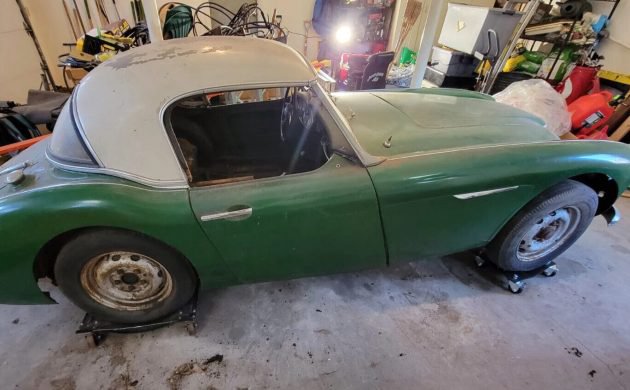
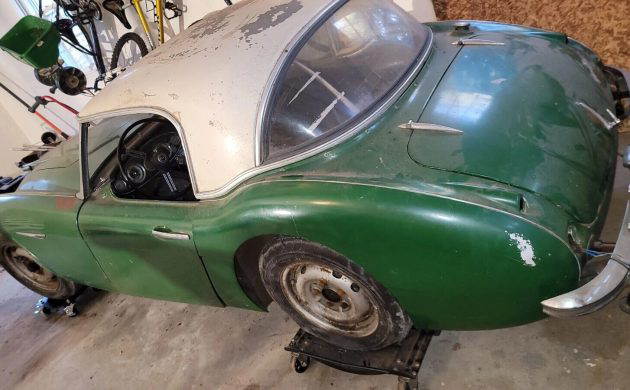


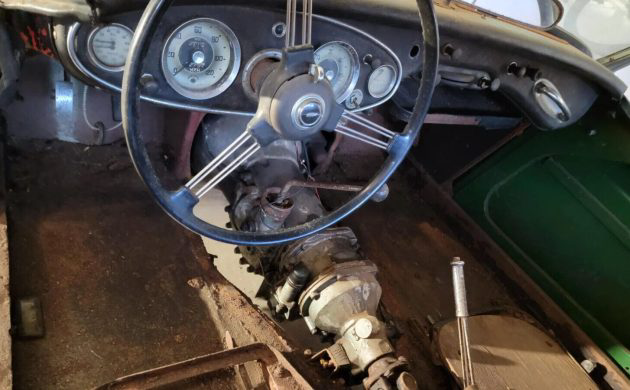
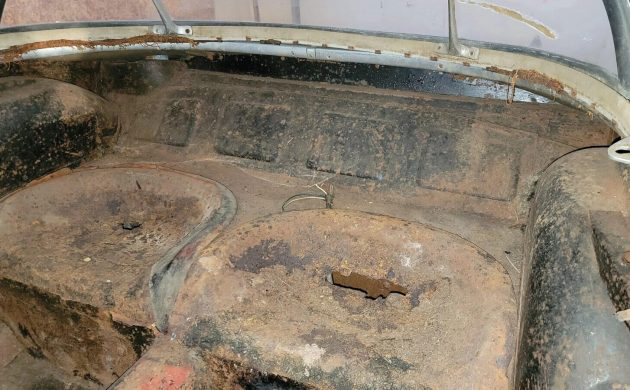
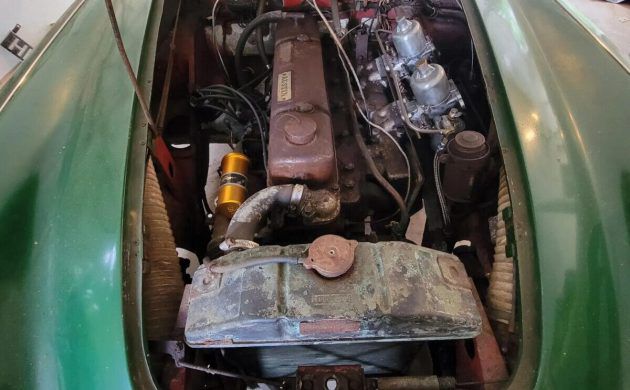

Comments
You’re not going to know the real rust problem until you take the body off the frame as a good portion of the floor sits right on top of the square frame rails. Owned two 100-4s and they both had the frame/ floor problem while the rest of the cars were rust free. The screwdriver in the rust hole tells me all I need to know. Price way too high.
My 2nd car was a 100.4. Bought when I was 15 for $300. It was sitting in a golf course parking lot for a long time. But I was lucky. Basically no rust at all. Just mechanically needed restoration which I did so that I could drive it my last 2 years of high school. Hot in the summer and cold in the winter.
I bought one the same color in 1965 because the price was really low- for good reason it turned out. The frame was rusted through just behind the seats and over one hard bump, if folded up. Lesson learned.
The biggest reason that the Healey 3000 was discontinued after the 1967 model year were looming DOT regulations in the USA, that the car could not meet.
In 1968-’69, the MGC was sold as a replacement. It was an MGB with the Healey’s 3 litre 6. It proved unpopular, and was also discontinued.
My brother had a ’58, 100-6, also with a later motor, a ’63, I believe. When he sees this, I’m sure he’ll plotz as to what these can go for today, although, the steam has fizzled considerable. 1st, the hardtop, very rare, as is the disc wheels. Fact is, of all the big Healeys I’ve seen, this is probably the second one. They all had wires. It was this car that made me a British roadster fan for life.
The 3000 was a bit more civilized, but basically the same car, and shortcomings include, but not limited to, they were hot to drive, cramped driving position, they rode rough, low to the ground. The exhaust, which runs under the driver, got torn off many times. The plus side there, its sound was unlike any stovebolt 6, I’ll tell you that. The up sides were many. FAST, we had it up to 120 once, I think, the speedo was bouncing, close enough, but a bit front heavy, but that long hood, and bullet proof mechanicals. It was one of the coolest cars I ever drove, and I drove a lot. I’m glad I got to experience this fine road car.
So, what happened, you might wonder? The car had funky brakes, someone pulled out in front of him, he mashed the brakes, I believe one side caught before the other, spinning the car around, mowing over a traffic island. Being so low, the car was toast.
Also related, a guy at the Walmart deli said, his sister and BIL were having a garage sale, and had a cool car I should see. When I went to the sale, I never saw so much stuff. The FIL was a trucker and had a ton of stuff, but I asked the guy about a classic car, he said, oh, you mean my AH? In the garage was a ’67 3000, BRG, it was spotless. The guy was my age, and said he bought it when he was 19. Kept it spotless all those years. It was not for sale.
That’s a Fred Flinstone car if I’ve ever seen one. I hope it gets restored, but that’s too far gone for my limited skills.
I had one of these when I lived in Germany in the early ’60’s. I think the biggest problem was that the car was made in England. There wasn’t a fuse within 50′ of the car. The electrics were by Lucas (the prince of darkness and the reason the English drink warm beer) and the wiring caught fire about every 6 weeks or so.
The engine, redlined at 5200 rpm, belonged in a tractor. The thing was so nose heavy there wasn’t a day in the week any old lady in a VW couldn’t pass me on the outside of any curve in the country. The cabin was so hot in the summer you had to wear asbestos socks, even with the top down. And, if you were to drive on anything except drop-dead smooth and level pavement you had to limit your speed to about 30 mph lest you drive over something like a match stick, toothpick or toilet paper tube which would rip the muffler off the car.
The car was so low to the ground it took a crane and 10 minutes to get me out of the thing. I loved it. In 3-years I put over 50,000 miles on it driving all over Western Europe. Went through gasoline (at $5.00 per gallon) like Custer went through Indians. A set of tires (at $18 apiece) lasted about 12,000 miles.
the body does not really come off the frame,the hood trunk,fenders and shrouds come off.then you have the scuttle,door shut faces etc,and the floor, inner and outer sills,rocker ,all attached to the frame.to do it right all need to be ,fixed or replaced,all even frame available.You have to keep it straight and square to do this.Do it for the love not the money.
it does have the later six port head and a nice looking hard top
rare disc wheel car
I had a 1960 Healey 3000 with disc wheels but the guy I sold it too restored it to Gold medal standard and fitted wire wheels with chromed spokes to it. When I had it the car was red but he changed it to blue and silver.
This is how I bought it as an unfinished rebuild.
It’s just easier to stand in a cold shower and continuously tear up thousand dollar bills.
A complete body off needed, frame looks trashed ,cost of a new frame if you can find one would be out of this world. way to much money for a parts car.
I owned two big Healey’s. One a ’67 and one a ’65. Paid $600 for the ’67 and $6,000 for the ’65. Both were in excellent driving condition. I kick myself when I realize I’ll never be able to afford one again. Still have a love affair with the big Healy’s and always will. I’d take this one under my wings and do my best to nurture it back to a safe and reliable stable member. Hope whomever gets this gem does it up right.
I’m actually working on a 58 4 seater 100/6 right now. The one listed even if restorable ( rust looks deep into the frame) would probably exceed the value when complete
Plus the heritage certificate says wire wheels but none on car, and where are the wire hubs?
I’m not member here but have many pics.
The urban legend that the MGC used the AH3000’s 6 cylinder mill is in correct. The two sixes have different ancestors and mechanical innards.
A dream car with a growing investment that will allow you to drive for years to come. Unfortunately, this Austin Healey has deteriorated over the years and no longer at present that pretentiual without spending thousands on new parts, which is a great shame for any classic car collector. The question the owner needs to ask himself. Who is willing to take this car on for free so that the owner can enjoy seeing this former car restored to its former glory. It’s certainly a brave challenge for anyone who’s willing to put his marriage on the line. We’ll anyway, it’s definitely something the owner should consider! Let’s face the facts here for a moment. Considering such a thought and its realisation are more satisfying than the dream of hoping to receive a large sum of money for a pile of junk that nobody will offer unless of course they have absolutely no idea what they are buying. Good luck!
Why would he want to give it away? All he has to do if it doesn’t sell here is either to bring the price down or put it on BF Auction with no reserve, at least he will get back some of his current expenditure.
Hi Solosolo UK,
Whether you give something away depends on the expectations you have, e.g. for a good cause or just to have a feeling of joy, a feeling that it’s worth it. You mentioned that lowering the price or auctioning the car, this will certainly raise a small amount, but not knowing whether the car will be used as spares or not knowing if the car will even scrapped is something the owner will have to deal with, but knowing that the Austin will be rebuilt and looked after and will give pleasure for many years to come is a satisfying payment. Wouldn’t you agree? Asking for more than the car is worth is just wishful thinking.
parts available just about everything…even frames..https://www.ahspares.co.uk/austin-healey/big-healey/inner-body-panels-ibp290-to-onwards/chassis-complete-1.aspx……https://jule-enterprises.com/the-frame